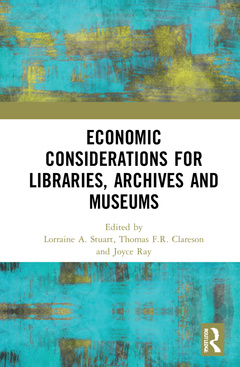Economic Considerations for Libraries, Archives and Museums
Coordonnateurs : Stuart Lorraine A., Clareson Thomas F.R., Ray Joyce

Economic Considerations for Libraries, Archives and Museums provides insight into the economics of collaboration across Libraries, Archives, and Museums (LAMs) and cultural heritage funding.
Drawing together a series of global reflections on the past, present and future of cross-sector approaches to preserving and promoting cultural heritage, this volume examines the economic prospects of LAMs from a variety of facets. Divided into five sections, the book covers the five most important areas in the development and sustainability of collaborative LAM projects: the digital environment; collaborative models; education; funding issues; and alternate sources of funding. Responding directly to the issue of a lack of adequate funding for maintaining and providing access to cultural heritage resources globally, the book argues that cultural heritage institutions must seek creative methods for funding and collaboration at all levels to achieve shared goals.
Economic Considerations for Libraries, Archives and Museums will be of interest to all those engaged in the study of library and information science, archival studies, museum studies and digital preservation. Administrators and practitioners will also find much to interest them within the pages of the book.
List of Figures and Tables; List of Contributors; Acknowledgements; Introduction; Section I - The Digital Environment: Chapter 1 Collaboration among Libraries, Archives, and Museums in the United States: 1999-2019; Chapter 2 A Case Study on the Future of Digital Technologies in Libraries, Archives and Museums: Collecting Institutions in the Network Society; Chapter 3 How and Why the European Union Promotes Collaboration to Connect Museums, Libraries, and Archives with Online Users Across Europe and Around the World: Europeana; Section II – Collaborative Models: Chapter 4 Lessons Learned from Digital Collaborations: Standards and Descriptive Practices; Chapter 5 Tribal Archives, Libraries, and Museums: ATALM A Practical Model for Local Collaboration; Section III - Taking a Look at LAM Education: What Works, What Could Work Better: Chapter 6 Libraries, Archives and Museums of the Future: Educational Programs in Europe; Chapter 7 Promoting Collaboration, Recognizing the Power of Information and Object in Professional Identity: Educating Library, Archives, and Museum Professionals in the United States; Section IV - Funding and Sustainability: Global Reach, Local Impact: Chapter 8 A Case Study for Collective Action Through Federal Grant Funding: Grant Programs that Saved History; Chapter 9 Funding, Sustainability, and Cross-Institutional Collaboration; Chapter 10 Collaboration North of the (U.S.) Border; Chapter 11 Banding Together Against Disasters: The Benefits of Collaboration in Times of Crisis; Section V – The Cultural Economy: Chapter 12 The Value of Archives and Authenticity in Exhibitions of Visual Culture; Chapter 13 Grassroots Collaborative Models for Visibility and Advocacy: Building on "LA as Subject"; Chapter 14 The Role of Libraries, Archives and Museums in the Cultural Economy – Perception, Documentation, and Vision for the Future; Index.
Associate Prof. Lorraine A. Stuart is Head of Special Collections/Curator of Historical Manuscripts and Archives at the University of Southern Mississippi. Previously, she directed the archival program at the Museum of Fine Arts, Houston from 1995-2016.
Thomas F. R. Clareson is Senior Consultant for Digital & Preservation Services at LYRASIS, consulting on preservation, disaster preparedness, digitization, funding, strategic planning, and arts and cultural advocacy. He also serves as Director of the Performing Arts Readiness project.
Joyce Ray, Ph.D., is Senior Lecturer and Program Coordinator of the Digital Curation program at Johns Hopkins University’s Division of Advanced Academic Programs, Museum and Heritage Studies.
Date de parution : 05-2023
15.6x23.4 cm
Date de parution : 11-2021
15.6x23.4 cm
Thèmes d’Economic Considerations for Libraries, Archives and Museums :
Mots-clés :
Cultural Heritage Funding; IMLS Grant; Mountain West Digital Library; National Library; American Library Association; Public Engagement; Lam; Salzburg Global Seminar; Cultural Heritage Institutions; IMLS; SAA; Professional Development; Cultural Heritage Organizations; Cross-institutional Collaboration; Linked Open Data; Digital Preservation; Cultural Heritage Sector; Tribal Archives; UNESCO Framework; Collecting Institutions; National Historical Publications; Digital Library; CRKN; USC Library; Arizona State Library


